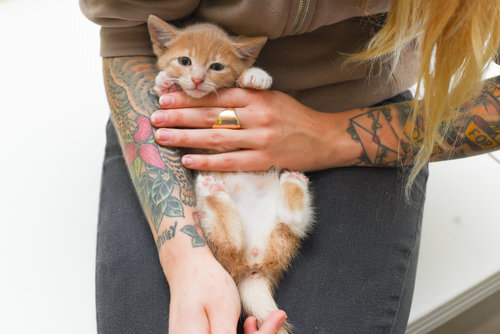Routine Care for Kittens
If you're caring for kittens, there are a few routine veterinary needs that you should know about. The following care should be given to every kitten you rescue, and in a timely fashion so that the kitten has the protection they need and can stay on track for adoption!
Vaccination
The FVRCP vaccine is an important standard vaccine that keeps kittens safe from the feline viruses rhinotracheitis, calicivirus, and panleukopenia. These viruses can be easily transmitted to a young kitten and can cause upper respiratory infections and even death--so it's crucial to protect kittens through vaccination. The FVRCP vaccine can be given at 4-6 weeks of age, and is boosted twice in 2-3 week intervals. FVRCP vaccines are generally administered by a veterinarian, or if you're working with a local rescue or shelter, they may administer them for you.
The rabies vaccine is given at 12-16 weeks of age and must be administered by a veterinarian. It is required by law in many states and should be boosted after one year, then every three years. Because this vaccine cannot be given until 3 months of age, a kitten can be adopted without one, so long as the adopter gets a rabies vaccine at the appropriate age.
Dewormer
All kittens should be treated for common gastrointestinal parasites at 2, 4, and 6 weeks of age. Some parasites can be treated at home, while others will require a prescription from a veterinarian.
To deworm a kitten at home for common parasites such as roundworms and hookworms, you'll need a digital scale, a 1cc syringe, and a bottle of oral dewormer which can be purchased online or at pet supply stores. You'll want to purchase Pyrantel pamoate 50mg/ml suspension which has a doasge of 1ml per 10 lbs of body weight--this measures out to .1ml per 1 pound of kitten. Regardless of the age you deworm, always follow up with at least one more dose 2 weeks later.
Many kittens carry other parasites such as coccidia or giardia that will require a prescription from a vet. For this reason, many rescuers and rescue groups choose to treat kittens with prescription drugs Panacur and Ponazuril, which offer a more broad range of protection against parasites.
Spay/Neuter
Spay/Neuter surgery should occur before adoption, and can be performed at 8 weeks of age and at 2 pounds.
Microchipping
Microchipping is advised for cats at the time of spay/neuter. Most importantly, make sure that the microchip is registered online to the adopter and/or the rescue organization.




